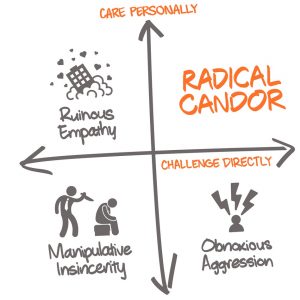That’s a question I’ve had to answer lately for sales managers in an organization where Compassionate Leadership is considered a foreign concept, “too soft” to be effective.
Here’s what they said:
- “I don’t have time for regular 1:1s. If staff have a problem, they know my door is open.”
- “They should want success more than I want it for them.”
- “If my staff feel they need me to help them succeed, they’re in the wrong business.”
Ouch.
I wondered if Compassionate Leadership was only a fit for “caring professions.”
But then I discovered Google’s Project Oxygen, a study that shows effective managers demonstrate care for their teams not only professionally, but also personally.
Huh.
Most of the Googlers I’ve met and read about are self-motivated, high-achieving, Type A folks—kinda like my sales manager clients.
Strategic Listening . . . with Heart
I was chomping at the bit to share this research with them.
Fortunately my umpteen years as a Leadership Coach have taught me when to keep my mouth shut and my ears open.
Listening rather than lecturing is a vital behaviour in Compassionate Leadership, by the way, one that fits with research indicating we increase our power by reducing it. I know. Whacky right?
Asking questions because you truly care about individuals and their experiences, and then empathetically listening to their responses . . .
- Creates the psychological safety people need to share ideas, express concerns, and acknowledge mistakes.
- Draws on curiosity, a primary positive emotion, which broadens our thinking and makes us more receptive and creative.
- Makes it easier for people to come up with their own answers, a strategy that ups the chances they’ll take action and perform well.
Google’s study found:
I don’t think those Googlers are much different from the rest of us.
Still, the idea of caring in the workplace felt weird for these folks. It just wasn’t an explicit and accepted part of their culture.
Hmmm.
 Candor with Care
Candor with Care
More conversation made it clear these leaders assumed a compassionate approach to managing would exclude difficult conversations and accountability.
Not true.
Rather, Compassionate Leadership involves believing the best about people and calling them out when they’re not following through on their goals.
How we tell the hard truths. ==> That’s what makes the difference.
We explored and practiced the idea Kim Scott calls Radical Candor, challenging people directly with deep caring.
People need to know what’s working and what’s not. It turns out they appreciate leaders who take the time to deliver feedback thoughtfully and honestly.
Who knew?
Surprising Results.
Things changed. Maybe not fast. And it wasn’t a direct route. But shift happened.
These managers recalibrated their mindset, sales results improved, and everybody was happier . . .
- The sales people felt more supported.
- The managers looked forward to helping their team members work through issues instead of needing to have all the answers.
What’s more, the learnings seem to be sticking.
It’s been several months now, and last I heard, these folks have sustained the new behaviours they’d initially doubted.
You heard it here first:
Compassionate Leadership is plenty tough enough to work in any sector, any setting.
Including yours.
Taking it further.
 The fates and synchronicity have partnered me with Willa Silver (sales coach extraordinaire) to work with sales teams over the past year.
The fates and synchronicity have partnered me with Willa Silver (sales coach extraordinaire) to work with sales teams over the past year.
It’s been remarkable.
If sales is your jam and you’re looking for sustainable sales results, reach out for a chat.
This is exactly the type of work we’ve been doing with leaders and teams, and they tell us it’s made a difference.
- Leaders are stepping out of the weeds and stepping up to develop so their team can grow.
- Conversations go deeper and are more engaging for the leader and the individual.
- And those same conversations are shorter than previous conversations that stayed superficial.
We’re here if you and your team wants some of that too.
Especially for Leaders & Teams in Seniors Care.
Maybe you’ve already seen the effectiveness of Compassionate Leadership with your team. After all, your work is all about compassion.
When I’ve noticed from my umpteen years supporting leaders and teams in Seniors Care is that the sector often attracts those who have the caring dialed, but the direct feedback when behaviours need to change? Not so much.
The thing is, Compassionate Leadership isn’t being a martyr or putting everyone else’s emotions and needs before your’s. That’s a recipe for resentment and burn-out.
Compassionate Leadership is making room to tell people the hard truths they don’t necessarily want to hear, and creating the space for them to be able to hear it.






